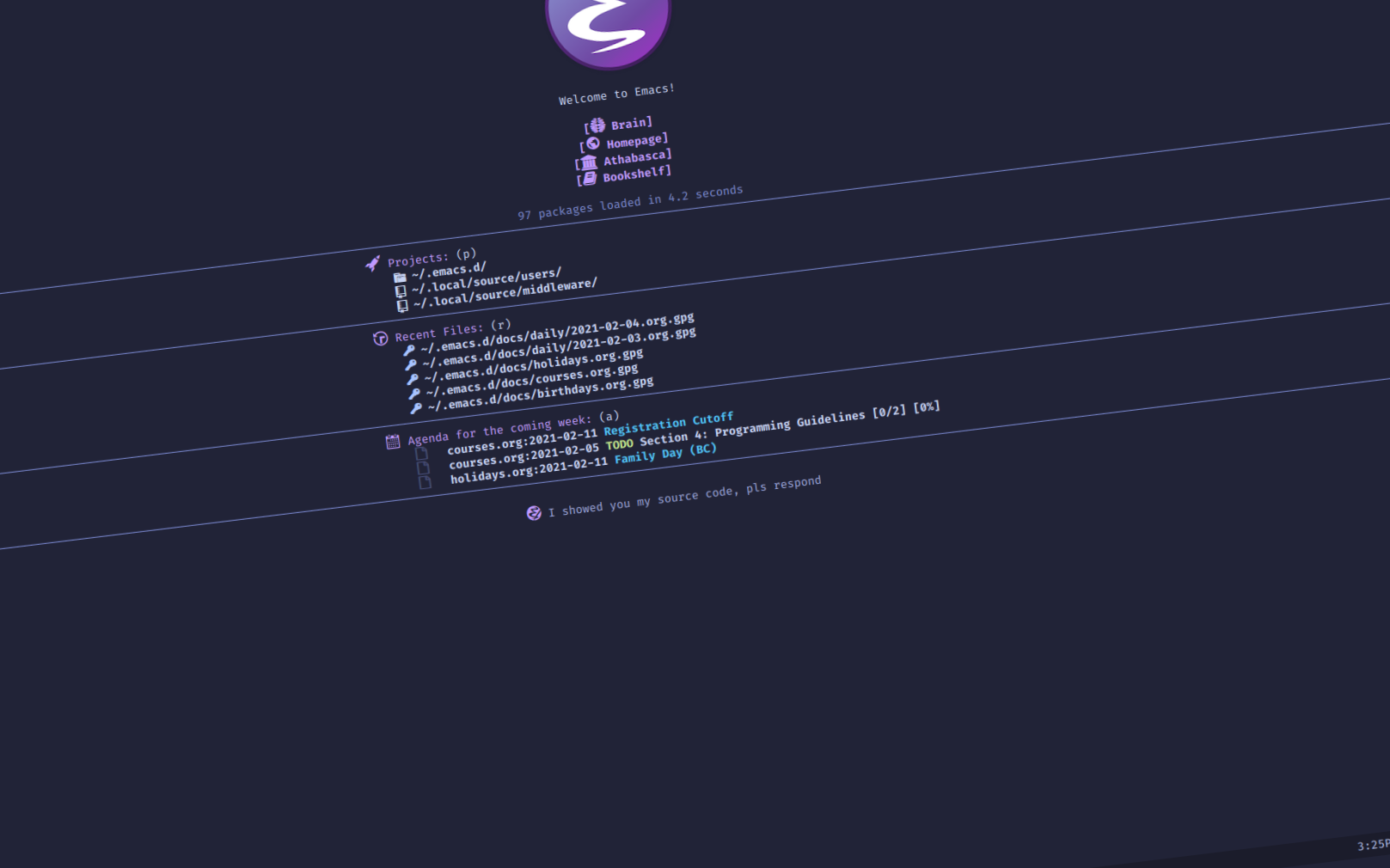|
|
4 years ago | |
|---|---|---|
| bin | 4 years ago | |
| config | 4 years ago | |
| docs | 4 years ago | |
| hosts | 4 years ago | |
| modules | 4 years ago | |
| .gitattributes | 4 years ago | |
| .gitignore | 4 years ago | |
| .gitmodules | 4 years ago | |
| LICENSE | 4 years ago | |
| README.org | 4 years ago | |
| init.el | 4 years ago | |
README.org
Dotfiles

Portable GNU Emacs1 dotfiles. Built for Life, Liberty, and the Open Road.
-
100% Literate
-
100% Immutable
-
100% Reproducible
What is it?
From the documentation1:
An extensible, customizable, free/libre text editor – and more
At its core is an interpreter for Emacs Lisp2, a dialect of the Lisp programming language with extensions to support text editing.
To highlight some of the features available out of the box:
-
Content aware editing modes
-
Complete built-in documentation
-
Full unicode support for all human languages
-
Packaging sysystem for third party extensions
-
Wide range of functionality beyond text editing
How does it work?
-
Emacs reads the configuration at
$HOME/.emacs.d/init.elat startup -
This file outputs some startup code to that location
-
Defines all of the options for hosts
-
Runs some required startup code
-
-
Loads the host definition file at
$HOME/.emacs.d/host/$HOSTNAME -
Loads the enabled modules in
dotfiles/modules
Options
Here's a complete list of all of the options configurable for each host, and their default values.
-
All variables prefixed with
dotfiles/ -
Initialized prior to loading of packages or hosts
(defvar dotfiles/home user-emacs-directory
"Original value of `user-emacs-directory'.")
(defvar dotfiles/cache (expand-file-name "~/.cache/emacs")
"Redirection target of `user-emacs-directory'.")
(defvar dotfiles/browser (getenv "BROWSER")
"Default system web browser.")
(defvar dotfiles/language (getenv "LANG")
"Default system dictionary language.")
(defconst dotfiles/modules-p
'(core
editor
shell
email
terminal
encryption
desktop
writing
website
capture
projects
development
interface
dashboard)
"All of the available modules.")
(defvar dotfiles/modules dotfiles/modules-p
"All of the enabled modules.")
(defvar dotfiles/font "Fira Code"
"Unified system font family.")
(defvar dotfiles/font-size 96
"Unified system font size.")
(defvar dotfiles/idle 0.0
"Delay time before offering suggestions and completions.")
(defvar dotfiles/leader-key "SPC"
"All powerful leader key.")
(defvar dotfiles/leader-key-global
(concat "C-" dotfiles/leader-key)
"Global prefix for the leader key.")
(defvar dotfiles/projects
(expand-file-name "~/.local/source/")
"Location of source code projects.")
(defvar dotfiles/passwords
(expand-file-name "~/.password-store/")
"Location of local password store.")
(defvar dotfiles/public-key
"37AB1CB72B741E478CA026D43025DCBD46F81C0F"
"GPG key to encrypt org files for.")
Startup
This project makes heavy use of modern features and libraries. Since Babel's 3 used in initialization, Org 4 must load prior to importing any of custom modules. This introduces a unique chicken or the egg 5 problem. My solution included some initialization code in Emacs Lisp 2 called before using any Babel 3 APIs.
(load-file "~/.emacs.d/bin/cleanup.el") (load-file "~/.emacs.d/bin/packages.el")
Getting started
How to install
-
Clone
git clone git@github.com:chayward1/dotfiles.git ~/.emacs.d -
Run
emacs --mm --debug-init
Hosts
Each host machines configuration loaded immediately after declaring the options, before applying any configuration. This allows system to system control while remaining immutable. Override any of the available options configurations in a host file. Here's some examples to get started:
Begin the process by loading any host specific overrides. The host configuration tangles, and loads (if it exist) using the systems name.
(let ((host-file (concat dotfiles/home "/hosts/" system-name ".org")))
(when (file-exists-p host-file)
(org-babel-load-file host-file)))
Modules
Breaking down the project into logical units or chapters to keep the code more maintainable and organized. This is also a fundamental requirement to achieve the goal of modularity. Here are all of the available modules, also listed in the variable dotfiles/modules-p.
By default all of the modules will load, override the variable dotfiles/modules in a host configuration.
(dolist (m dotfiles/modules)
(let ((mod-file (concat dotfiles/home "/modules/" (symbol-name m) ".org")))
(when (file-exists-p mod-file)
(org-babel-load-file mod-file))))